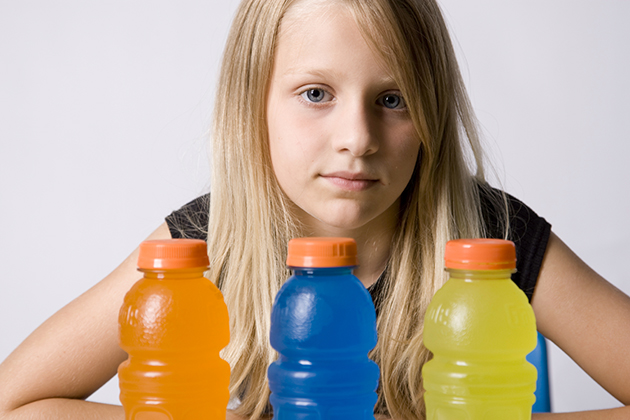
Despite public health messages about the importance of reducing consumption of sugary drinks, many parents believe that some beverages with high amounts of added sugar – especially fruit drinks, sports drinks, and flavored water – are healthy options for children, according to a new study from the Rudd Center for Food Policy and Obesity at the University of Connecticut published today in Public Health Nutrition.
“Although most parents know that soda is not good for children, many still believe that other sugary drinks are healthy,” said Jennifer Harris, a study author, UConn associate professor-in-residence. “The labeling and marketing for these products imply that they are nutritious, and these misperceptions may explain why so many parents buy them.”
The study found that 96 percent of parents surveyed gave sugary drinks to their child in the month prior to the survey. Those who had given sugary drinks to their child provided them in an average of three different categories. Fruit drinks and regular soda were provided most often – by 77 percent and 62 percent of parents, respectively – followed by sports drinks, sweetened iced tea, and flavored water.
Among parents of children ages 2 to 5, 80 percent provided fruit drinks, such as Capri Sun or Sunny D. Forty percent provided regular soda.
Parents who reported purchasing a given category of sugary drinks were significantly more likely to rate that category as healthy, compared to parents who did not purchase any drinks from that category.
Nearly half of the parents surveyed rated flavored water as healthy, and more than a quarter considered fruit drinks and sports drinks to be healthy. African-American and Hispanic parents were more likely than white parents to rate some sugary drinks as healthy.
Many parents said nutritional claims appearing on packaging, such as indications that items were real or natural, contained vitamin C or antioxidants, or were low in calories or sodium, were important factors in their purchasing decisions. These claims are most prevalent on packaging for sugary drinks in the categories that parents most often perceive as healthy: fruit drinks, sports drinks, and flavored waters.
Parents also were likely to rate the healthfulness of specific branded products more favorably than the general categories that they represented. For example, while only 30 percent of parents considered fruit drinks healthy, 43 percent rated Sunny D and 36 percent rated Capri Sun fruit drinks as healthy. Similarly, while fewer than half of parents believed flavored water was healthy, 56 percent of parents rated Vitamin Water as healthy.
“This study shows that public health efforts and messages urging reduced consumption of sugary drinks should focus on fruit drinks, sports drinks, and flavored water, as well as soda,” said Marlene Schwartz, a study author, UConn professor and director of the Rudd Center. “There also needs to be increased attention to ingredient claims on product packaging and other marketing tools that may mislead parents to believe that some sugary drinks are healthful options for their children.”
Previous research has shown that children and teens consume more than twice the recommended amount of sugar, and that sugary drinks are the top source of added sugar in Americans’ diets.
The most recent Dietary Guidelines for Americans recommend limiting added sugar to 10 percent of total calories. An expert advisory panel convened by Healthy Eating Research in 2013 advised in its Recommendations for Healthier Beverages that children ages 13 and under drink only water, low‐fat and nonfat milk, and 100 percent juice, and that adolescents ages 14 to 18 drink only water, low‐fat and nonfat milk, 100 percent juice, and other non-caffeinated, non-fortified beverages with no more than 40 calories per container.
The study, called “Parents’ beliefs about the healthfulness of sugary drink options: opportunities to address misperceptions,” surveyed an ethnically diverse, national sample of 982 parents, each with at least one 2‐ to 17‐year‐old child, in 2011.
The Robert Wood Johnson Foundation (RWJF) funded the study. RWJF recently committed $500 million over the next 10 years to ensure that all children in the United States can grow up at a healthy weight, no matter who they are or where they live. One of the Foundation’s five strategic priorities is to eliminate the consumption of sugar-sweetened beverages among children 5 years old and younger.



